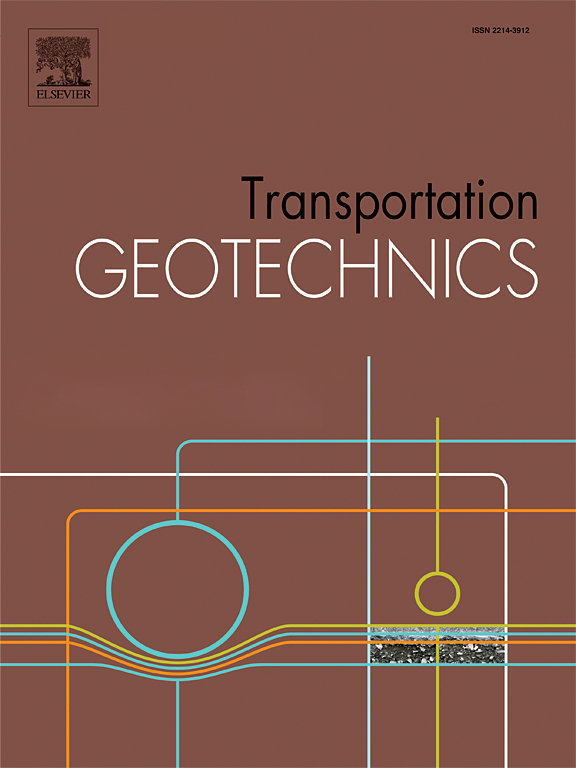Evaluation of expanded polystyrene as a lightweight material in road construction under cyclic loading
IF 5.5
2区 工程技术
Q1 ENGINEERING, CIVIL
引用次数: 0
Abstract
The construction industry is increasingly seeking sustainable materials to address the limitations of conventional subgrade materials in road construction. This research investigates the application of expanded polystyrene (EPS) as a subgrade material to improve the performance of road pavements subjected to cyclic loading. It explores EPS’s potential as an effective and sustainable alternative for subgrade materials in road construction. The findings may suggest that utilizing EPS can extend pavement lifespan and lower maintenance costs under certain conditions. The study involved experimental tests using Expanded Polystyrene (EPS) blocks with varying densities and thicknesses, positioned beneath sand subgrade layers to simulate road traffic conditions and evaluate their effect on roadway performance. The findings indicate that EPS considerably reduces both total and permanent settlement in road pavements. Specifically, higher-density EPS blocks exhibit improved load-bearing capacity and enhanced resistance to deformation. Furthermore, increasing the density of EPS boosts its performance under cyclic loading. Employing thicker reinforcement layers leads to even more significant reductions in settlement. Key outcomes include a 20–35% reduction in soil settlement when using EPS, as well as significant improvements in load distribution and resilience under cyclic loading, particularly in configurations utilizing high-density EPS combined with geosynthetic reinforcements.
循环荷载作用下膨胀聚苯乙烯轻质材料在道路施工中的评价
建筑行业越来越多地寻求可持续材料,以解决传统路基材料在道路建设中的局限性。本文研究了膨胀聚苯乙烯(EPS)作为路基材料的应用,以改善循环荷载作用下道路路面的性能。它探讨了EPS作为道路建设中有效和可持续的路基材料替代品的潜力。研究结果表明,在一定条件下,使用EPS可以延长路面寿命,降低维护成本。该研究包括使用不同密度和厚度的膨胀聚苯乙烯(EPS)块进行实验测试,将其放置在砂路基层下,模拟道路交通状况,并评估其对道路性能的影响。研究结果表明,EPS大大减少了道路路面的总沉降和永久沉降。具体而言,高密度EPS砌块表现出更好的承载能力和增强的抗变形能力。此外,增加EPS的密度可以提高其在循环载荷下的性能。采用更厚的加固层导致沉降更显著的减少。主要成果包括使用EPS可减少20-35%的土壤沉降,并显著改善循环荷载下的载荷分布和弹性,特别是在高密度EPS与土工合成增强筋相结合的配置中。
本文章由计算机程序翻译,如有差异,请以英文原文为准。
求助全文
约1分钟内获得全文
求助全文
来源期刊

Transportation Geotechnics
Social Sciences-Transportation
CiteScore
8.10
自引率
11.30%
发文量
194
审稿时长
51 days
期刊介绍:
Transportation Geotechnics is a journal dedicated to publishing high-quality, theoretical, and applied papers that cover all facets of geotechnics for transportation infrastructure such as roads, highways, railways, underground railways, airfields, and waterways. The journal places a special emphasis on case studies that present original work relevant to the sustainable construction of transportation infrastructure. The scope of topics it addresses includes the geotechnical properties of geomaterials for sustainable and rational design and construction, the behavior of compacted and stabilized geomaterials, the use of geosynthetics and reinforcement in constructed layers and interlayers, ground improvement and slope stability for transportation infrastructures, compaction technology and management, maintenance technology, the impact of climate, embankments for highways and high-speed trains, transition zones, dredging, underwater geotechnics for infrastructure purposes, and the modeling of multi-layered structures and supporting ground under dynamic and repeated loads.
 求助内容:
求助内容: 应助结果提醒方式:
应助结果提醒方式:


